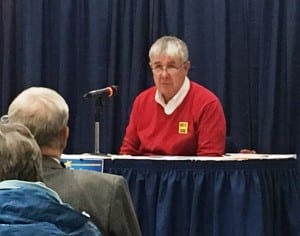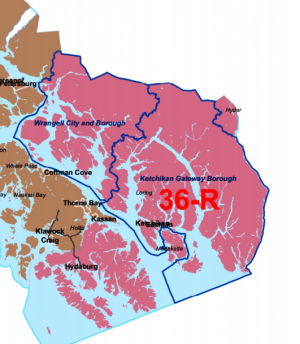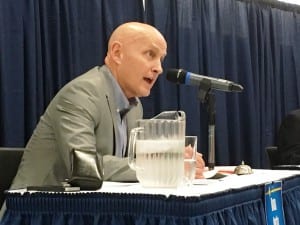Two of the three candidates for House District 36 answered questions for more than an hour Wednesday during a debate in Ketchikan hosted by the Ketchikan Daily News.
Republican Bob Sivertsen and incumbent Dan Ortiz, who is not affiliated with a party, both focused on who would be most effective in the Legislature, because as far as policy goes, there’s not much difference between the two.
Constitution Party candidate Ken Shaw was not part of the debate.
Here’s where the two candidates substantially agreed during the debate: Sivertsen and Ortiz say using part of the Permanent Fund earnings needs to be among the solutions to Alaska’s fiscal problem; they both support maintaining funding for the Alaska Marine Highway System, or at least keeping any cuts in line with cuts elsewhere in the Department of Transportation budget; and they support taking care of the state’s elders by minimizing cuts to senior services and Pioneers Homes.
In fact, they agree on a lot of things. When asked by debate moderator Nick Bowman of the Ketchikan Daily News to name three issues where they differ, neither could come up with a list.
So, the biggest point of contention is how each would caucus if elected, and what their caucus choice would mean to the constituency.
Ortiz caucused with the mostly-Democratic minority for the past two years, after he was not invited to join the Republican-led majority. He says there is a likelihood that Republicans will not win a majority this year, which would lead to a “tri-partisan” coalition of Republicans, Democrats and non-affiliated candidates.
“That majority will be much more friendly to the interests and to the needs of District 36 … and that’s why I’m so excited about the prospect of serving because I know that if I get elected, we will be a majority that will be much better at meeting the interest of our particular district,” he said.
Sivertsen countered that a Republican Majority is the most likely outcome of the November election.
“Over the past 26 years if you had bet on something other than a Republican-led Majority, you’d have been wrong 26 times,” he said. “I feel that there’s still going to be a Republican Majority. The lack of having representation in that Majority – you’re not in the room when they caucus and write the budget. The Majority is the one that writes the budget.”
Ortiz argued that the previous Republican majority cut funding for ferries and other issues that are important to Southeast. He says in that case, his position outside of the Majority actually was beneficial to the district, because he was able to negotiate restoring funds in exchange for his vote to use budget reserves to fill the deficit.

Republican candidate for House District 36 Bob Sivertsen speaks during the debate. (Photo by Leila Kheiry)
But, Sivertsen says the cuts that were restored during negotiations were bargaining chips and never would have been cut in the first place if the district had someone in the Majority.
The candidates did have some other differences of opinion, mostly on how they would prioritize programs and funding. On cuts, Sivertsen says he would let the different agencies decide where to cut back within their programs. Ortiz says he wants the Legislature to reform Senate Bill 21, which regulates the state’s oil taxes. He says Alaska is giving too much away, especially in these tight fiscal times.
Sivertsen agrees that SB21 is not working well for Alaska right now.
On taxes, Ortiz says he favors an income tax over a sales tax, because sales taxes are a main revenue source for local governments.
“I’ve heard from the (Alaska) Municipal League quite clearly on that issue, and I would be more in support of an income tax,” he said. “I do think the Permanent Fund restructuring that the governor has proposed needs to be part of the solution. It’s what moves the dial the most and it’s what protects the dividend into the future, so there is a dividend in the future.”
Sivertsen says he wants to make sure whatever taxes the state implements are fair to everyone in the state, but he didn’t specify which kind of tax he thinks would be the most fair.
 “Does everybody get a tax? Or just part of the people? The income tax is going to affect only about 48 percent of the population,” he said. “The rest of them aren’t working, for whatever reason. How fair is that? We’re going to have to have taxes, but we’re going to have to make sure we do it in a real intelligent, well-informed manner to know what the exact impact that’s going to have on Alaska and on businesses.”
“Does everybody get a tax? Or just part of the people? The income tax is going to affect only about 48 percent of the population,” he said. “The rest of them aren’t working, for whatever reason. How fair is that? We’re going to have to have taxes, but we’re going to have to make sure we do it in a real intelligent, well-informed manner to know what the exact impact that’s going to have on Alaska and on businesses.”
The two candidates also differed somewhat on where they would rank the importance of three primary Southeast industries: Fishing, timber and tourism.
Ortiz ranked fishing first, followed by timber and then tourism. Sivertsen says fishing and tourism are doing fine without additional assistance, so he placed timber at the top of his list.
The two candidates also were asked how they would vote for president this year. Neither directly answered the question, saying instead who they wouldn’t vote for.
Sivertsen said, “I’m not voting for Hillary (Clinton).”
Ortiz said, “I’m going to follow the lead of Sen. Murkowski and Sen. Sullivan. I will not be supporting Donald Trump for the presidency.”
Each answer received applause, but Ortiz’s answer also generated some boos.
Ortiz is a retired high school teacher. He taught for about 30 years in Ketchikan, focusing on government and economics; and he coached the debate team.
Sivertsen worked for many years as head of the City of Ketchikan’s Solid Waste Department. Soon after his retirement, he was elected to the Ketchikan City Council, and just last year was re-elected to a three-year term.
We’ll have a later report focusing on Constitution Party candidate Kenneth Shaw, and KRBD will host a live, on-air candidate forum featuring all three candidates starting at 7 p.m. Nov. 2.
The general election is Nov. 8.








